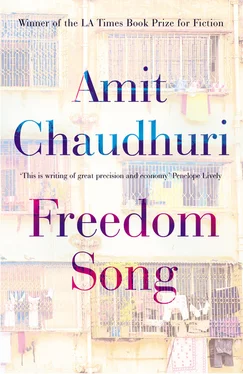Later, Dadamoni came to Calcutta with his brothers and sisters and rented a flat not far from where they were now; and took a job as a sales representative in a chemicals company. They’d lost their home; but there was the silent, incommunicable excitement of beginning anew in what was now their own country. When they walked down the road and saw a large hoarding advertising Dutta Chemicals, they felt proud as if at a secret knowledge. (They hardly remarked later on the demise of Dutta Chemicals; it had gone out of business in the Seventies, but their lives were so different by then they had hardly noticed it.)
When Khuku spent three days in Calcutta on her way to England in 1955, to marry Shib, Mini’d been living in a lane with Dadamoni, Shantidi, Chanchal, and Shyamal in the rented flat. Khuku then told Mini how beautiful the city seemed to her, for this was her first visit here; and urged Mini to marry. She had someone in mind, she said, a young man called Kalidas Sengupta who worked in an advertising firm. For those three days she pursued the subject of Mini’s marriage, to Mini’s slight embarrassment. Then she was gone for six years.
Shantidi came out now, half-blind with the bath. She was cold.
When he was only forty-two years old, Dadamoni died. The day before he died of a heart attack, he’d had a meal of ilish fish, a noble specimen caught from the Ganga whose virtues he commended as he slowly sorted the bones in his mouth. Later, when the pains had started, he’d thought, at first, that it was indigestion. And in less than two years, Chanchal, who was running a catering business, contracted tuberculosis; and tuberculosis was still incurable in those days. With Dadamoni’s death (his photograph hung on the wall in the smaller room) everything changed with a slow momentum that they did not fully grasp; and their destinies turned out to be different from what even a year ago they believed they might have been. The possibility of Shantidi’s and Mini’s marriage became more remote; and then, they did not know exactly when, it no longer remained a possibility. In a way they were left innocent, like children, never to know what one part of life was, not particularly worried by their ignorance, with an inexhaustible core of freshness and even romance, touched and changed only by time’s attrition and the uncontainability of their own affections. They gradually stopped thinking and talking about it as one stops thinking about things whose meaning one outgrows or transcends. Meanwhile, Khuku and Shib returned to Calcutta from England as, strangely, touchingly, husband and wife, Shib armed with rare and desirable qualifications of which Khuku was proud as if she had taken the exams; and their first and only child was born in a nursing home in South Calcutta. Everything had happened in Khuku’s life at an abnormally slow pace: married at the age of thirty, she was giving birth to this son after years of trying. Khuku was thirty-seven years old, and Shib forty, his hair already half grey, but his face strikingly young.
A sound from outside, like something beating against metal. There it was, again and again.
Mini would sometimes remember the two years they’d spent in Calcutta after returning from England. Bablu learning to walk, taking his first steps in the courtyard of their house in New Alipore; Khuku become plump and motherly compared to the thin woman she’d been before leaving for England, her hair dark and thick, fanning out behind her unmanageably; proud of her husband’s new job in a company that made bread. She was still singing of course; she was looking for a music teacher to teach her new songs not in her repertoire. And Mini was working in the school. She still wore almost the same kind of saris as she did now, pale, with a thin coloured border, and tied her hair in a bun.
Other noises flowed in, between the metal being beaten, as if all material things in the neighbourhood were gradually being transformed into sound.
Then Khuku and Shib had moved to Delhi, and, for twenty-five years, Mini would see Khuku only when she visited Calcutta once a year, usually in the summer.
Not long after Dadamoni’s death, they’d been allocated this flat in the New Municipal Corporation Building.
Mini walked towards the table in front of the fridge and poured herself a glass of water.
At one end was the small kitchen. In the centre was a space where the table was kept, and a clothes-line hung from one end to another; and to the left was a window covered by a wire gauze. The walls enclosed a medium-sized space that was partially filled with light.
The obscure lines of the gauze had become dark and sometimes a feather which had been stuck there might remain there until it had been worn away. That window opened onto the intricate jumble of lanes and terraces of North Calcutta, receding and approaching, mirroring and leading towards each other, and towards Girish Park and Vivekananda Road. Although Mini’s age was reduced by five years in her documents she was due to retire in about two years.
The two sisters were tenants here, although there had been talk for some time (always listened to with interest, always exciting a small ripple of speculation) that people who had lived in their flats for more than fifteen years would be given ownership. Among the tenants themselves there had been a tentative self-appraisal: ‘Yes, I’ve been here for seventeen years’; or ‘It’s nineteen years this year.’ The numbers were like a revelation. Time suddenly seemed to have passed quickly, even forgivingly. Each year for the last five years an official said: ‘It’ll be this year.’
Until nine years ago Mini and Shantidi used to live in this flat with their younger brother Shyamal and his family. He used to work as a junior manager in a small company; all three of them going out each day to work; reuniting at tea-time in the afternoon; Shantidi and Mini beginning to cook a meal in the kitchen at seven o’clock. That was their life after Dadamoni’s and Chanchal’s death. Then his sisters began looking for someone for him to marry; they discovered Lalita, younger daughter of a Professor Hiren Shome of Sylhet, who was beginning life as a schoolteacher herself. Shyamal and Lalita were married, and she moved into the tiny flat, and the second room on the right, near the kitchen, became their bedroom. A few months later, a trivial incident caused a misunderstanding between her and Mini and Shantidi. There was nothing unnatural about that: for they had to live, eat, cook, and breathe and the newly-weds lead their married life in the same small space. Yet that was Calcutta then, and everything was possible and probable in their lives; and they were grateful for the flat. While Mini went out to work, Shantidi made sweets, boiling and condensing milk, frying things. Then Lalita had two children, both boys; but the quarrels between their mother and their aunts continued. The quarrels did not affect the boys’ relations with Mini and Shantidi; they loved and harassed and disconcerted the two women who were gradually ageing. And it was lovely to have children growing up in the flat, with tricycles and Ludo boards coming in the way, and rubber balls bouncing off beneath the bed.
Nevertheless things seemed to go on indefinitely with their portion of affection and unpleasantness and joy.
But what was begun in a certain way never arrived at its expected conclusion. So there was almost no surprise when nine years ago Shyamal and his family moved to a house in a different part of the city. And the two sisters were left to lead their lives in this building.
‘Didi, I’m off,’ said Mini, before setting out for the school — matter-of-factly, as if she was off to attend a political rally.
She was wearing a fresh sari; her small handbag and a cloth bag hung from her shoulder.
Читать дальше












